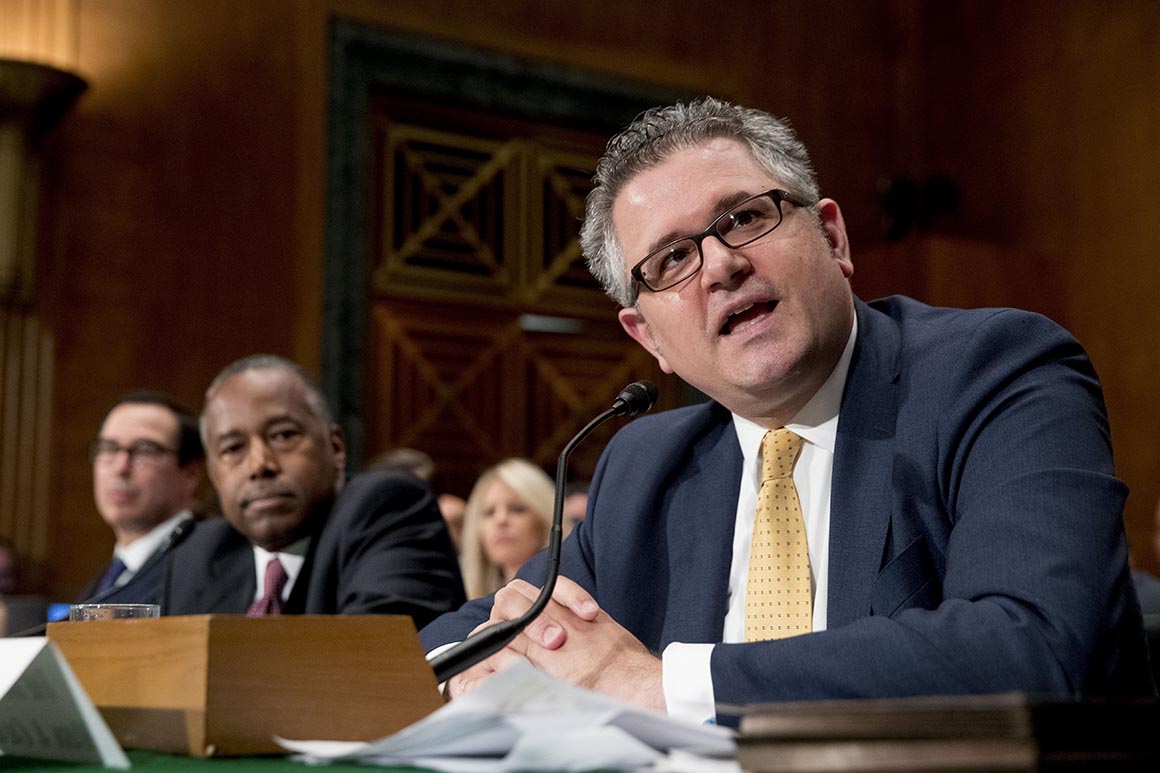
“The mortgage market feels very fragile and on the verge of shutting down,” said Moody’s economist Mark Zandi, who has forecast that a staggering 30 percent of homeowners will seek a suspension of their mortgage payments in the months ahead.
While it’s possible that a much lower number of borrowers may ultimately use programs to delay those payments, Zandi said, it’s unwise for Calabria to bank on the rosier outlook in the current environment.
“I don’t get it,” Zandi said. “Any forecast here is possible, but it feels increasingly unlikely in the context of what will be 15-20 percent unemployment, and the longer he waits to guard against the downside, the costlier it’s going to be for [Fannie and Freddie], the mortgage servicers and ultimately the consumer.”
“A prudent regulator would be focused on the downsides and guarding for that,” he said.
The FHFA said it is on top of the situation.
“FHFA continues to focus on making sure borrowers understand their forbearance options and are not put out on the street during this national health emergency,” agency spokesperson Raffi Williams said. “We will continue to monitor the data closely, and make data-driven decisions to ensure the health of the housing finance system.”
Fannie and Freddie buy and guarantee loans from mortgage lenders, pooling them and bundling them into securities for sale on the bond market, freeing up the lenders to make more loans.
Calabria, a former Senate Banking Committee aide under Alabama Republican Sen. Richard Shelby and an economist at the libertarian Cato Institute, came to the top housing regulator job in April 2019 widely respected by both the mortgage industry and affordable housing advocates.
Now, he has “torched” his credibility, according to one industry insider. “There is no taxpayer argument in this that makes any sense,“ the person said. „You probably would make money if you were going to do a lending facility” for servicers.
Announcing a plan to help servicers would also have secondary effects in calming the markets, according to analysts, by encouraging wary banks to maintain lines of credit for the companies amid the turmoil.
Calabria “may be right that servicers in aggregate can handle this, but that may be irrelevant if the rest of the world is skeptical of that and cut off warehouse lines for the whole industry,” Zandi said.
And if servicers do go under, Fannie and Freddie will be tasked with transferring mortgage servicing rights to other companies — a costly process in an economic downturn — or end up taking losses.
“FHFA’s stance makes little sense, either from the taxpayer’s perspective or from their role as conservator. Providing short-term, collateral-backed liquidity to servicers would avoid the operational and financial challenges“ of transferring those rights, said Michael Bright, CEO of the Structured Finance Association, which represents 370 financial institutions in the bond market.
“It’s leaving market participants scratching their heads for sure,” Bright added.
Dworkin warned that “we can very easily fall into the trap that we did 10 years ago of being obsessed with moral hazard and ending up with an immoral result” that ultimately hurts consumers and taxpayers.
Zandi suggested the moral hazard argument — that the government shouldn’t provide incentives for risky behavior in the market — has no bearing on the current crisis.
“FHFA made the decision to give borrowers forbearance, so FHFA should bear the cost of that, not the mortgage servicers who didn’t make that decision,” Zandi said. The congressional relief package codified the forbearance Fannie and Freddie were already offering.
Meanwhile, if servicers are “struggling to survive, they’re not going to make loans, which is what the economy needs,” Zandi added.
Mortgage bankers are scrambling to get the Federal Reserve to offer help to servicers, fearing that Calabria is counseling against any sort of lending for servicers. The Mortgage Bankers Association fired off a late-night statement slamming him for his “troubling” remarks ruling out a Fannie and Freddie program for servicers last week.
The demand for a pause in mortgage payments, or forbearance, is already surging. Requests for forbearance leaped 78 percent in the first week of April, according to data from the Mortgage Bankers Association, which reports that 3.74 percent of all loans are now in forbearance, up from 0.25 percent the first week of March.
Aaron Klein, a Treasury official under President Barack Obama who’s now at the Brookings Institution, is advocating for the establishment of a streamlined refinancing program akin to the 2010 Home Affordable Refinance Program the FHFA set up in 2009. That program reduced payments for over 3 million homeowners.
“If we can help people keep their homes, if we can help families tap into their home equity during this crisis, we ought to do that, as opposed to prioritizing the balance sheet of two companies the government owns,” Klein said.
Dworkin agreed, pointing to the extraordinary government actions small-government Republicans initiated in the last crisis.
“One of the most valuable lessons learned from Ben Bernanke and Hank Paulson is that as the crisis exploded, they took all of their ideological foundations and threw them into the garbage can, and they thought completely outside the box,” Dworkin said. “The federal officials who are able to do that will be remembered as the ones who were successful.”
Source: politico.com
See more here: news365.stream






